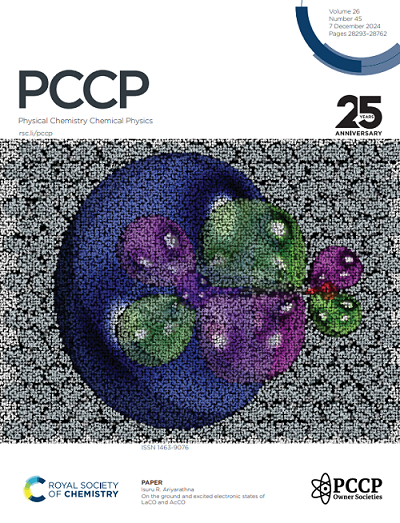Diffraction of fast heavy noble gas atoms, Ar, Kr and Xe on a LiF(001) surface, changing the tip of a ‘perfect’ AFM
IF 2.9
3区 化学
Q3 CHEMISTRY, PHYSICAL
引用次数: 0
Abstract
We investigate experimentally the diffraction of fast atoms of noble gas on a LiF(001) crystal oriented along the [100] and [110] directions. All exhibit some quantum features but wavelengths are so short that these effects are qualitatively described by semi-classical models. With increasing mass and energy, the scattering profiles show an increasing number of diffraction peaks forming an increasing number of supernumerary rainbow peaks but progressively weakening in contrast with the innermost peaks correspond to individual quasi-specular Bragg peaks disappearing first. Along the [100] direction, all observed azimuthal profiles are well described by Bessel functions allowing a simple semi-quantitative analysis. After removing the contributions of the attractive forces, we show how the surface corrugation amplitude and its variation strongly depend on the probing atom. These data should be compared with those accessible with an atomic force microscope (AFM).

快速重惰性气体原子,Ar, Kr和Xe在liff(001)表面上的衍射,改变了“完美”AFM的尖端
实验研究了稀有气体的快原子在沿[100]和[110]取向的LiF(001)晶体上的衍射。它们都表现出一些量子特征,但波长太短,这些效应只能用半经典模型来定性描述。随着质量和能量的增加,衍射峰的数量增加,形成了越来越多的多余彩虹峰,但逐渐减弱,最里面的峰对应于单个准镜面布拉格峰首先消失。沿着[100]方向,所有观测到的方位角剖面都可以用贝塞尔函数很好地描述,允许进行简单的半定量分析。在除去引力的贡献后,我们展示了表面波纹振幅及其变化如何强烈依赖于探测原子。这些数据应该与原子力显微镜(AFM)获得的数据进行比较。
本文章由计算机程序翻译,如有差异,请以英文原文为准。
求助全文
约1分钟内获得全文
求助全文
来源期刊

Physical Chemistry Chemical Physics
化学-物理:原子、分子和化学物理
CiteScore
5.50
自引率
9.10%
发文量
2675
审稿时长
2.0 months
期刊介绍:
Physical Chemistry Chemical Physics (PCCP) is an international journal co-owned by 19 physical chemistry and physics societies from around the world. This journal publishes original, cutting-edge research in physical chemistry, chemical physics and biophysical chemistry. To be suitable for publication in PCCP, articles must include significant innovation and/or insight into physical chemistry; this is the most important criterion that reviewers and Editors will judge against when evaluating submissions.
The journal has a broad scope and welcomes contributions spanning experiment, theory, computation and data science. Topical coverage includes spectroscopy, dynamics, kinetics, statistical mechanics, thermodynamics, electrochemistry, catalysis, surface science, quantum mechanics, quantum computing and machine learning. Interdisciplinary research areas such as polymers and soft matter, materials, nanoscience, energy, surfaces/interfaces, and biophysical chemistry are welcomed if they demonstrate significant innovation and/or insight into physical chemistry. Joined experimental/theoretical studies are particularly appreciated when complementary and based on up-to-date approaches.
 求助内容:
求助内容: 应助结果提醒方式:
应助结果提醒方式:


